Free Data Analytics Course
Jumpstart your journey with 25 essential learning units in data analytics. No cost, just knowledge.
Wondering what the average data analyst salary is? Or how much junior data analysts earn? Let’s take a look at just how much data analysts make by evaluating the average salary data provided gleaned using labor statistics. While these data analyst salaries are variable, it will give you a good indication of what the highest-paying and most in-demand careers are. Bear in mind that your education level, work experience, and even location (e.g. Custer, South Dakota vs New York City, New York), and specializations can impact how much you make per year.
The demand for data analysts and data science professionals has been growing these past few years and especially so since the Covid-19 pandemic. Given the demand for highly skilled data analysts, there has been a corresponding increase in salaries too. PayScale shows that data analysts across organizations and consulting firms are paid well, with a high national average per year and a positive job outlook. Most data analysts are paid fairly, and the more senior workers earn higher salaries than many other professions. The average data analyst salary is around $64,000 per year, and an entry level data analyst salary is around $36,000 per year or more. The highest-paying jobs reach $100,000 per year or more. But the average salary per year depends on the analyst’s quality and years of experience, technical skills possessed, the employer, location, and industry, as well as their data analytics skills. (And some data analyst jobs pay better than others!)
Having said that, even entry level data analysts earn a great average salary per year and data analyst jobs are always in-demand.
In this blog post, we will discuss the top salaries per year for data analysts in various industries, the different data analyst jobs you can pursue, and what you can do to increase your value and negotiate a higher pay as a data analyst. We’ll also steer you towards the highest paying job title. But first, let us look at what a data analyst does and what the average data analyst salary is.
What Do Data Analysts Do?
Every business generates a lot of data that is a potential goldmine of information, and they need data analysts to help them uncover this. For instance, knowing the top-selling product lines by geography or tracking trends in customer activity by day and time. Data analysts are tech employees who use a combination of analytical ability, knowledge of programming languages and machine learning, and business understanding to conduct statistical analysis on vast datasets and glean actionable insights from them. Data analyst jobs can cover a variety of areas of speciality and industries. Collecting data and processing data is just a small part of the job.
Data analysis activities typically include the following:
- Data analysts collect data, clean it, and examine it for trends to support business decisions and suggest improvements
- Data analysts use Python, SQL, or other programming languages and statistical tools to process data and decipher information
- Data analysts write reports and use visualization tools using their data analytics skills
- Some data analyst jobs require coding knowledge in specific languages.


Become a Data Analyst. Land a Job or Your Money Back.
Transform real-world datasets into actionable recommendations. Master technical and strategic thinking skills and frameworks. Land a job — or your money back.
Following the Data Analyst Career Track
The data analyst career track is a highly relevant and in-demand field in today’s data-driven world. Data analysts play a crucial role in organizations by collecting, analyzing, and interpreting large volumes of data to derive meaningful insights and support data-driven decision-making processes.
Data Analyst Average Salary Per Year
Data analyst salaries can vary per year depending on factors such as experience level, location, industry, and skillset. On average, data analysts earn a competitive salary, with an average base salary ranging from $90,500 per year to $110,000 per year according to labor statistics. An entry level data analyst salary is around $30,000 per year. The salary for a data analyst per year can also be influenced by the level of education and specific technical skills possessed by the individual. According to Glassdoor labor statistics, the average salary for data analyst is around $80,000 per year. Where data analysts work can also impact how much data analysts make. It is possible to earn an average higher than the national average if you land at a company that offers higher salaries, or if you have years of experience in your field that commands a higher csot. A data analyst job at Google, one of the highest paying companies in the information technology space, pays over $160,000 per year as an average annual salary. Data analysts make the same average annual salary at Meta and Wish, but a data analyst’s salary is around $140,000 per year at Alibaba per labor statistics. There aren’t stats regarding the per year salary for data analysts that work freelance, although some estimates say it’s upwards of $60,000 per year.
Data Analyst Jobs
There is a significant demand for data analysts across various industries. Job opportunities for data analysts are plentiful and in-demand, with an estimated search volume of 18,100 per month. Data analysts can find employment in sectors like finance, healthcare, e-commerce, marketing, and more, as virtually every industry relies on data analysis to optimize their operations and strategies. The per year salary for a data analyst will vary based on their job title. Luckily, the job outlook is positive.
Data analysts jobs can vary, from helping making key business decisions as a senior analyst to entry-level data analyst jobs where you crunch numbers and clean files, but all data analyst jobs offer a fair earning potential.
Data Analytics Skills
Data analysts need to possess a specific set of skills to excel in their roles. Some of the essential data analytics skills include proficiency in programming languages like Python or R, proficiency in SQL for data manipulation and extraction, data visualization skills to effectively communicate insights, statistical analysis, and an understanding of data modeling techniques.
A specialization within the data analyst field is financial data analysis. A financial data analyst focuses on analyzing financial data, such as sales figures, market trends, investment portfolios, and risk assessments. They often work in the finance industry, where their analytical skills are crucial for making informed decisions and supporting financial planning.
Data analysis is the core responsibility of a data analyst. It involves examining data sets, identifying patterns, trends, and correlations, and drawing meaningful insights from the collected data. Data analysts use various statistical and analytical techniques to analyze data and present their findings in a clear and understandable manner to stakeholders. Data analysts use data visualization tools and techniques to communicate complex data and insights in a clear and concise manner, making it easier for stakeholders to understand and make informed decisions based on the data.
Entry-Level Data Analyst
Entry-level data analyst positions are available for individuals who are new to the field or have limited work experience. These roles typically require a bachelor’s degree in a related field such as mathematics, statistics, computer science, or economics. Entry-level data analysts can gain valuable experience and enhance their skills while working alongside experienced professionals.
While a bachelor’s degree is often the minimum requirement for entry-level positions, obtaining a master’s degree in a field such as data science, business analytics, or statistics can provide a competitive edge and open doors to more senior or specialized roles. A master’s degree can also lead to higher-paying positions and increased earning potential. The average salary per year for an entry level analyst will vary.
How Much Do Data Analysts Make Per Year?
According to the LinkedIn community‘s labor statistics, the average data analyst salary in the US is $90,000 per year. Data analysts can earn up to $125,000 per year based on experience, location, industry, company type, etc. Data analysts can also get annual bonuses and sign-on bonuses over and above your salary. Google the average data analyst salary to find out what a fair offer is and aim for the highest paying offer. Remember, your job outlook is great, so data analysts don’t have to settle for less than average salaries. Negotiate with human resources!
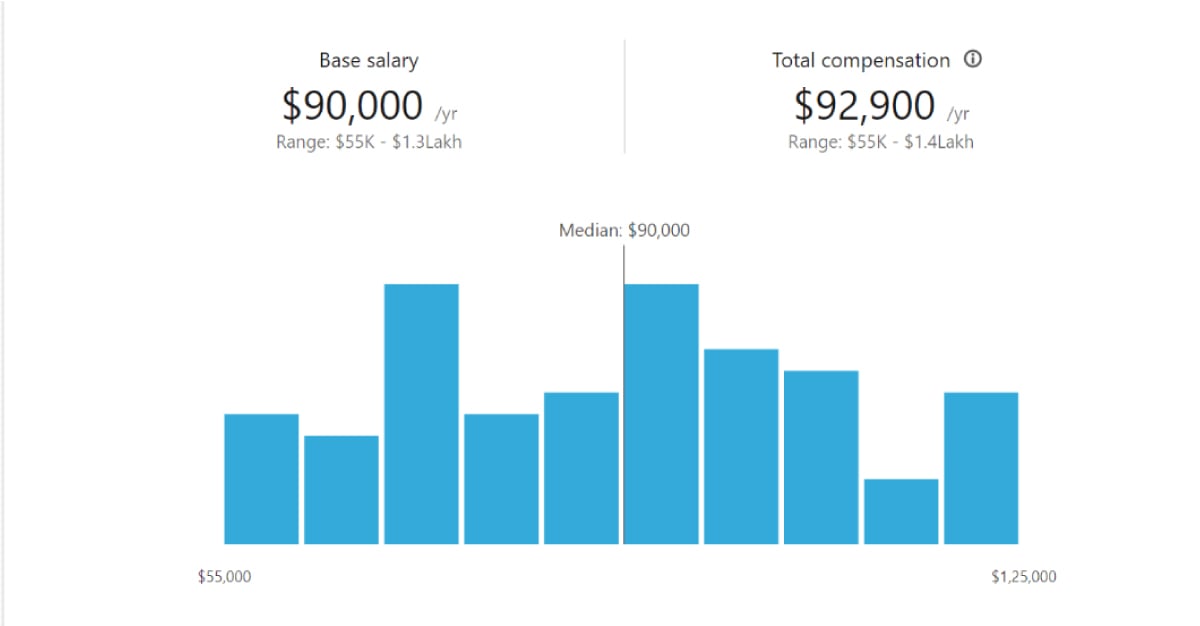
The Robert Half Technology Salary Guide 2022 found that the average salary for an entry-level data analyst is $116,375 per year. Professionals with exceptional skills and niche experience can earn as much as $167,913 per year.
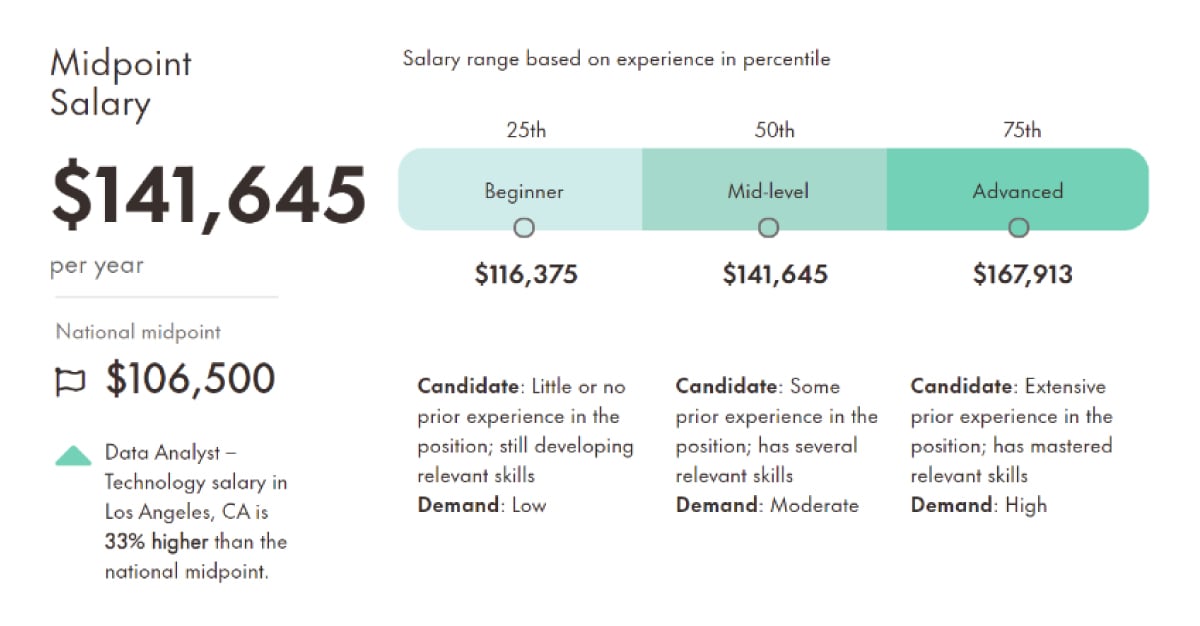
As you see from the table of labor statistics above, your skills and experience have a major influence on the salary you can command. the highest-paying roles require a specific skill set.
Data Analyst Salaries by Role
Here are some common roles in data and potential career paths for each. These are options you could choose and not necessarily linear progressions. Your job title and salary can vary.
| Job Title | Data Scientists | Data Analysts | Data Scientists |
| Job Description | Capture, clean, sort, and organize big data. Identify ways to do this more efficiently and effectively. | Gather, review, and analyze data to provide actionable insights for critical business decisions. | Design and develop information systems and build infrastructure/ architecture used in data generation. |
| Career Paths | Depending on specialization: – Data visualization – Data mining – Business intelligence – Database management – Data analyst | Business/marketing/financial analyst Systems analyst Analyst programmer Analytics manager | Data architect Database administrator Big data engineer |
| Average Salary | $105,000 per year | $65,000 per year | $97,000 per year |
Now that you know the essential difference between data scientist vs data analyst vs data engineer let’s dive a little deeper into the career paths a data analyst could take.
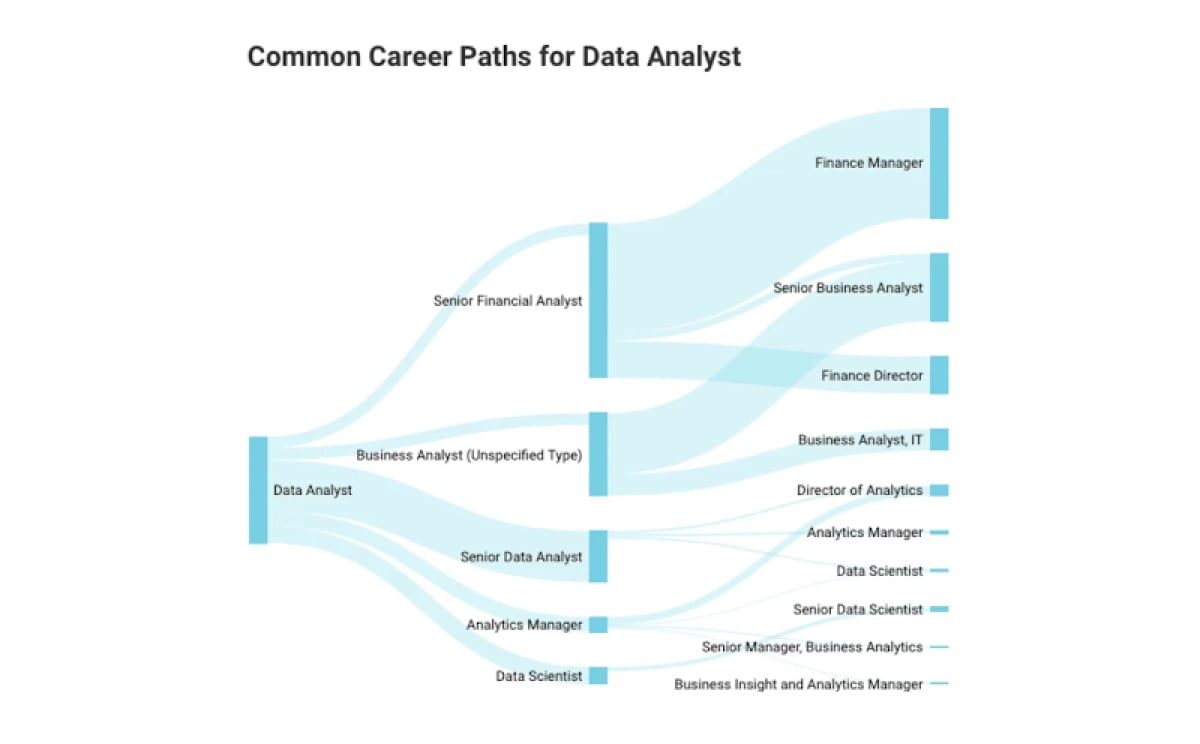
Data Analyst
The primary responsibility of an entry-level data analyst is to identify trends, patterns, and relationships within the collected data and derive insights. They also use data mining techniques to organize the information and present reports to stakeholders. Organizations use these insights to make business decisions.
To find a job as a data analyst, you don’t need a degree in mathematics or statistics, although these are obviously a plus. Many organizations today are open to hiring professionals with basic education and a data analytics certification, along with strong technical skills. Skills required to become a data analyst are programming languages like Python or R, database languages like SQL, analytical tools like Microsoft Excel, and computing environments like MATLAB.
Entry-level data analysts can earn anywhere from $41,000 to $93,000. The highest paying roles are in leadership. Data analytics leaders with experience can earn over $250,000. Data analysts make around $140,000 in specialist companies like VMWare.
Also read: How to Become a Freelance Data Analyst

Business Analyst
At their core, business analysts are analytical problem-solvers who work within a business or organization to identify areas that can be improved; they work with stakeholders such as managers, technical teams, vendors and others to offer data-backed recommendations.
Mostly a business-oriented role, BAs often have a bachelor’s degree in business or project management. They are also required to have skills such as critical thinking, logical reasoning, analytics, and design thinking. Knowledge of tools like SQL, BPMN, Microsoft Visio and Excel which help them perform data mining and cleaning, reporting, etc., is an advantage. Business analysts earn an average salary of $70,000 in the US and those with 3-4 years of experience in the role can earn a data analyst’s salary of around $109,000 per year.

Marketing Analyst
A marketing analyst (MA) is very much like a business analyst but specializes in marketing data to derive insights about sales, markets, channel performance, and promotions. An MA combines research skills, analytical skills, and marketing know-how such as customer profiling, ROI calculations, and advertising channel performance. For example, a marketing analyst will need to know what conversion rates are, what the cost per conversion is, what the lifetime value of a customer is, and so on.
In addition to the tools used by data analysts (like Python or R), MAs also use Google Analytics, online advertising, and CRM tools.
The average marketing analyst salary starts at $59,400 and can go up to the highest-paying level of $122,000 depending on experience level. This role can also progress to becoming a senior analyst, a marketing consultant, or a strategist with a higher pay package.

Source: LinkedIn
Data Analyst Salaries by Industry
Industries that pay the best data analyst salaries are the ones that benefit the most out of big data analytics. These include technology, healthcare, finance, and government agencies.
Let’s look at them one by one.
Technology
Data analysts play a critical role in tech companies and therefore, command top salaries. There are a few different types of tech companies and your role as an analyst in each will be slightly different, aligned to the individual company’s goals and nature of work.
Under tech services, there are four major kinds of companies:
- Information Technology (IT) companies that create custom solutions for enterprises or offer analytics services—for example, Cognizant, Infosys, IBM
- Software companies who create and sell software to end consumers. Business analytics software like Tableau or even Microsoft, Meta, Google, etc.
- Independent software vendors who build industry-specific products for other enterprises. For example, AWS, Oracle, Cisco
- Analytics solution providers handle the analytics needs of other businesses. For example, Mu Sigma, Fractal, Absolutdata, Tiger Analytics
According to LinkedIn, the average salary for data analysts in software and IT services is $65,000. Leading companies often pay much higher:
| Company | Average (In USD) | Range (In USD) |
| 99,500 | 65,700-120,000 | |
| Apple | 95,800 | 69,000-190,000 |
| Meta | 123,000 | 96,000-150,000 |
| Microsoft | 93,060 | 11,000-226,000 |
| IBM | 80,556 | 28,000-167,000 |
Healthcare
The healthcare industry has to deal with thousands of megabytes of unstructured data daily. Hospitals and other healthcare centers seek data analysts to unscramble fragmented data from patient records, clinical trials, and billing details and convert it to usable insights.
With over 35,000 job postings on LinkedIn alone, the healthcare industry is emerging as one of the top creators of data analyst jobs. The average salary of a data analyst in healthcare is a little higher than average at $72,595. Some of the high-paying organizations are listed below.
| Company | Average (In USD) | Range (In USD) |
| GlaxoSmithKline | 92,833 | 66,000-121,000 |
| GE Healthcare | 61,042 | 55,000-77,000 |
| CVS Health | 51,631 | 51,000-59,037 |
| Acadia Healthcare | 50,000 | 48,984-53,091 |
Healthcare data analysts can also leverage data for:
- Diagnosis of diseases
- Drug discovery
- Recognizing potential health risks
- Recommending prevention plans
- Delivering prescriptions
- Hospital operations
- Developing strategies for customized care
- Post-care monitoring
Additionally, two key issues in healthcare analytics are privacy and security. As a data analyst, you can score a higher salary by building expertise in any of these niches within healthcare.
Government
From infrastructure to transportation, public health, and law enforcement, governments at every level deal with massive amounts of data that needs to be organized and analyzed to identify better ways of executing programs and find innovative solutions to problems. This is why many government agencies, including the FDA, the Department of Transportation, Environmental Protection Agency, NASA, the Census Bureau, FBI, and others hire data analysts.
The average pay for a data analyst in the US Federal Government is $103,734.
| Role | Average (In USD) |
| Computer Forensic Analyst | 86,878 |
| Business Analyst | 94,564 |
| Political Analyst | 109,946 |
| Operations Analyst | 116,619 |
Finance
Financial institutions and legacy banks are relying on leveraging data to stay relevant in the market and compete for profitability. Financial data analysts work in many areas and build solutions for securing customer data, classifying customers, algorithmic trading, detecting fraud, underwriting, credit scoring, risk modeling, lending, and loan appraisal, etc.
According to Glassdoor, the average pay of a financial data analyst is $64,375 but for those with relevant experience, this can go up to $200,000.
| Company | Average (In USD) | Range (In USD) |
| Capital One | 87,473 | 50,000-200,000 |
| Wells Fargo | 70,699 | 12,000-200,000 |
| JP Morgan Chase & Co | 72,690 | 42,000-200,000 |
| Centene Corporation | 69,799 | 45,000-100,000 |
The finance industry is a highly specialized field. A strong analytics foundation and an understanding of financial services will pave the way for a successful financial data analyst career. Familiarity with machine learning and predictive analytics are especially helpful for careers in fraud detection, security, and credit.
Get To Know Other Data Analytics Students
Gilles Ngomeni
Sales Analyst at Medline Industries
Rahil Jetly
Sales Operations Manager at Springboard
Yogita Nesargi
Data Engineer at Deloitte
Data Analyst Salaries by Experience
Let’s explore what data analyst salaries are at each level of experience. Typically, the career growth in years for a data analyst is as follows:
- Entry-level data analyst: 1-4 years
- Mid-level data analyst: 5-9 years
- Senior data analyst: 10+ years
Entry-Level Data Analyst Salary (< 4 Years)
According to Glassdoor, entry-level data analysts get an average salary of $66,266. The salary can range from $27,000 on the lower end to $62,000 for the highest-paid junior data analysts.
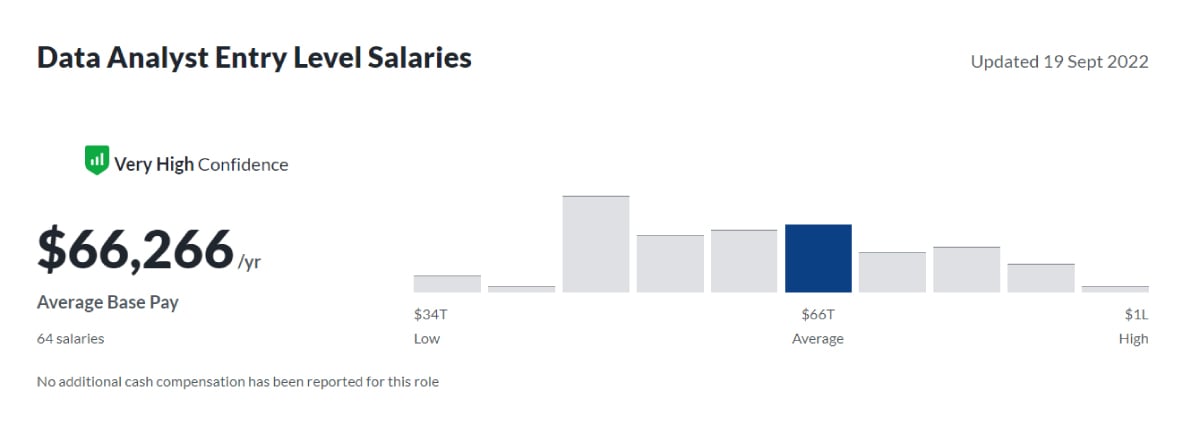
Mid-Level Data Analyst Salary (5–9 Years)
A mid-level data analyst earns $81,415 annually on average. The number goes up to $100,000 per year on the higher end of experience and paymasters.

Senior Data Analyst Salary (10+ Years)
With over a decade of experience under their belt, senior data analysts make, on average, $96,000 per year and at the higher end of the scale, up to $250,000. From there on, proving leadership abilities and business acumen can lead to a position as a senior manager or director of Analytics, culminating in a CTO role.
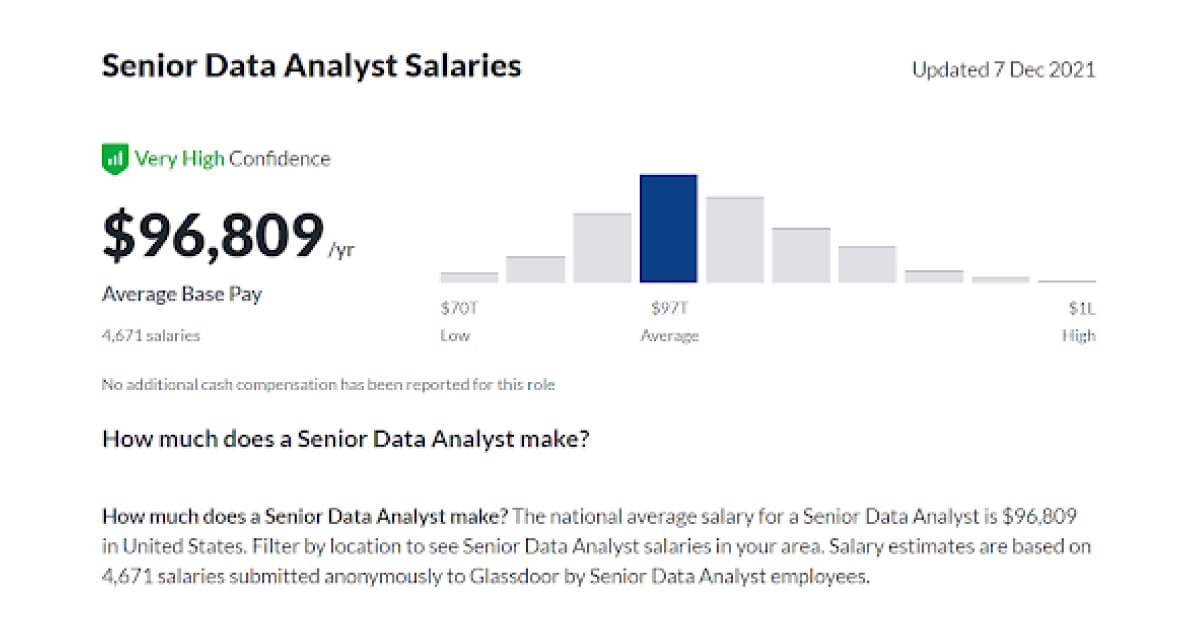
Data Analyst Salaries by Education
No Degree
Candidates without a degree can still land an entry-level position and can make $41,000 to $93,000.
Bachelor’s Degree
Data analysts with a bachelor’s degree can earn an average pay of up to $130,000. As you can see, an expensive or elite master’s degree isn’t really necessary to land a well-paying data analyst position.
Master’s Degree
According to the Burtch Works study 2021, organizations pay high salaries for candidates with a Master’s or Ph.D., for whom the median salary can go up to $140,000.
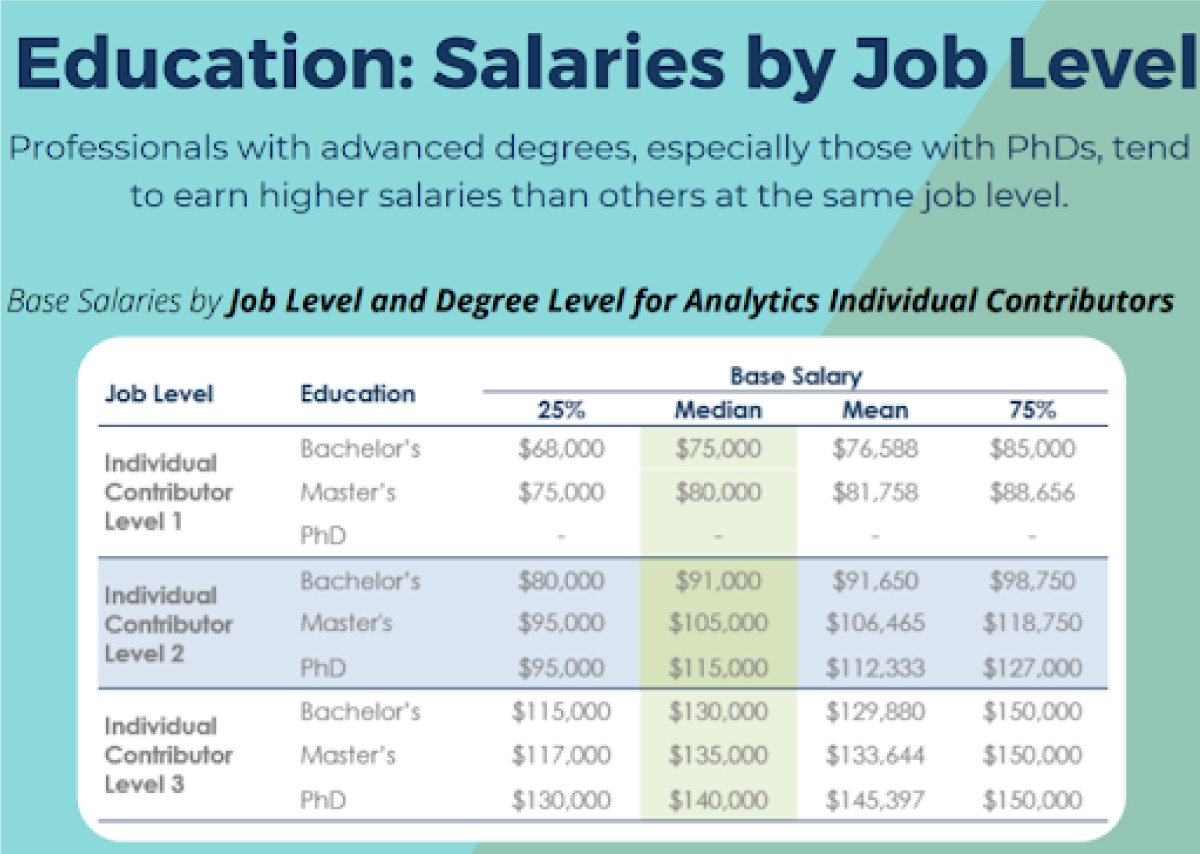
5 Ways To Boost Your Data Analyst Salary
Whether you are a junior data analyst looking to get a foot in the door or a mid-level professional looking to step up your career, there are quite a few things you can do to find a great job and get higher pay. Your data analyst job may not be flexible in terms of salary, but they can offer perks that can supplement your data analyst’s salary. Here are five ways.
Expand Your Skill Set
Data analytics is a highly technical field in which having a current, relevant skill set is crucial for success. Learning the latest tools in the field will increase your earning potential dramatically. As per an IBM report, some valuable analytical tools like MapReduce (average salary of $115,907), PIG ($114,474), Apache Hive ($112,732), machine learning ($112,732), and Apache Hadoop ($110,562). You could also familiarize yourself with Scala, Spark, D3, and cloud services like Amazon Web Services.
Choose the Right Location
Chicago, New York, San Francisco, and other large cities tend to pay the most but also come with a higher cost of living. Remote positions may pay less but come with the flexibility of working from home which is cheaper and could be more attractive. If you are considering a new job, calculate the cost of living as well as state taxes you’ll have to pay, to evaluate the offer.

Gain More Experience
IBM reports that 81% of data science and analytics jobs require 3-5 years of experience. In addition to adding years to your experience, you can also complete freelance projects to boost your portfolio through popular platforms like Kaggle, Toptal, Upwork, and Fiverr. If you have no prior experience, these are good ways to get some on your resume while also making some income on the side. If you already have a few years of experience, these could be a way to build breadth in fields outside of your day job.
Negotiate Your Job Offer
When considering a data analyst position, apply with the goal of receiving multiple offers. You can then use this compensation information as leverage to negotiate a higher salary at your dream company.
Glassdoor estimates that 17% of American employees—18% of men and 16% of women, report negotiating their salary and getting more money in their current or most recent job. By understanding your market value, you can score an extra 13% or up to $8,000.
Compare offers while negotiating your salary, and make sure to consider the full package provided by each company. Include bonuses, benefits, and other perks in addition to cultural fit, career paths, and mentorship.
Pursue a New Degree or Certification
In 2017, IBM reported that only 6% of data analyst postings require a master’s degree or higher, and 39% of data scientist and advanced analytics postings require only a graduate-level degree. Returning to formal education is an option, but it can be expensive. Instead, focus on building skills or upskilling through practical, job-focused bootcamps and online courses, particularly those led by professionals or which have industry partnerships.
Springboard’s free learning path for data analytics is for anyone looking for a short, intensive introduction to the topic. The Data Analytics Career Track is for candidates with experience and looking for more intensive training as data analysts.
FAQs About Working as a Data Analyst
Is Data Analytics a Good Career?
Yes, data analytics is a very good career with high earning potential and booming opportunities. About 2.5 quintillion bytes of data are created daily. This explosion of data is driving industries to leverage it, and data analysts are at the forefront of this trend.
Do Data Analysts Get Paid Well?
Yes, data analysts are in-demand, the pay is also rising. Entry-level data analyst positions pay above the $40,000 mark and senior positions typically pay well over $100,000.
How Can I Earn an Average Salary That’s Higher Than Typical Data Analyst Salaries?
The average salary for data professionals vary based on education level, location (e.g. do you live in New York or South Dakota?), work experience, and whether or not you work for one of the highest-paying tech companies in the US.
How Much Does a Data Analyst Make?
The average starting salary for a data analyst in the United States in 2021 is $90,000, according to LinkedIn. The US Bureau of Labor Statistics reports a median salary of $86,200, while the Robert Half report lists a midpoint salary for a data analyst at $106,500. You can take a look at Glassdoor and other sites to find out how much data analysts make in your area, bearing in a mind that every data analyst job offers different perks over and above the basic data analyst’s salary. There is increasing demand for data analysis professionals, so the average salary for a data analyst will continue to grow.
Do You Need an Advanced Degree To Be a Data Analyst?
No, you can build a career in data analytics even without a formal degree. Sign up for comprehensive bootcamps, like the Springboard data analytics bootcamp to build your skills. Get insights into navigating the data analytics industry, learn to negotiate salaries with human resources, and more to ensure that you are paid fairly. There are plenty of entry-level data analyst jobs that pay good money, but you may have to learn new skills to get one. A degree comes at a higher cost, and will delay the start of your career, although the average salary for data professionals with degrees may be higher.
What Is the Difference Between Someone’s Average Salary and their Average Annual Salary?
“Average salary” refers to the typical amount of money earned by an individual in a specific job or profession over a year, including bonuses and other compensation. “Average annual salary” is the total amount of money earned by an individual in a year from their job, without factoring in additional compensation like bonuses.
Is There a Data Analyst Role That Pays More Than Others?
How much data analysts make depends on their work experience and specialty. The more specialized you are and the more experience you have, the more you’ll earn. Try learning new skills and building up your work experience to earn more.
What Factors Influences Salaries For Data Analysts?
There are a number of factors that influence the average data analyst salary per year. Salaries for data analysts are generally good, regardless.
The earning potential and average salary for a data analyst in the United States can vary depending on a number of factors, including their education level, their location (someone in San Francisco will always out-earn someone in South Dakota), whether or not they have an advanced degree, the number of job opportunities available (general economic and job outlook), seniority (entry level as opposed to senior) and their year of experience.
What Are Salaries For Data Analytics Like Per Year Compared to Other Professionals?
Even entry-level data analytics unlock great salaries with their job title, thanks to increasing demand for big data analysis and machine learning skills. Here are what are labor statistics say about the average data analyst salary per year vs other professions:
A software engineer can make $102,234 per year, not including the $4,000 they receive in bonuses per year.
According to Glassdoor, the average salary for a web developer in San Francisco is $105,000 per year, while in New York City, it is $92,000 per year.
The median base salary of a cybersecurity professional in the U.S. is about $100,000 per year.
A data analyst can make up to $86,000 per year when they are starting out. A senior data analyst will earn a lot more per year. For example, a senior data specialist will earn $105,524 per year. A Senior Data And Reporting Professional will earn around $114,739 per year.
Since you’re here…
Interested in a career in data analytics? You will be after scanning this data analytics salary guide. When you’re serious about getting a job, look into our 40-hour Intro to Data Analytics Course for total beginners, or our mentor-led Data Analytics Bootcamp.






